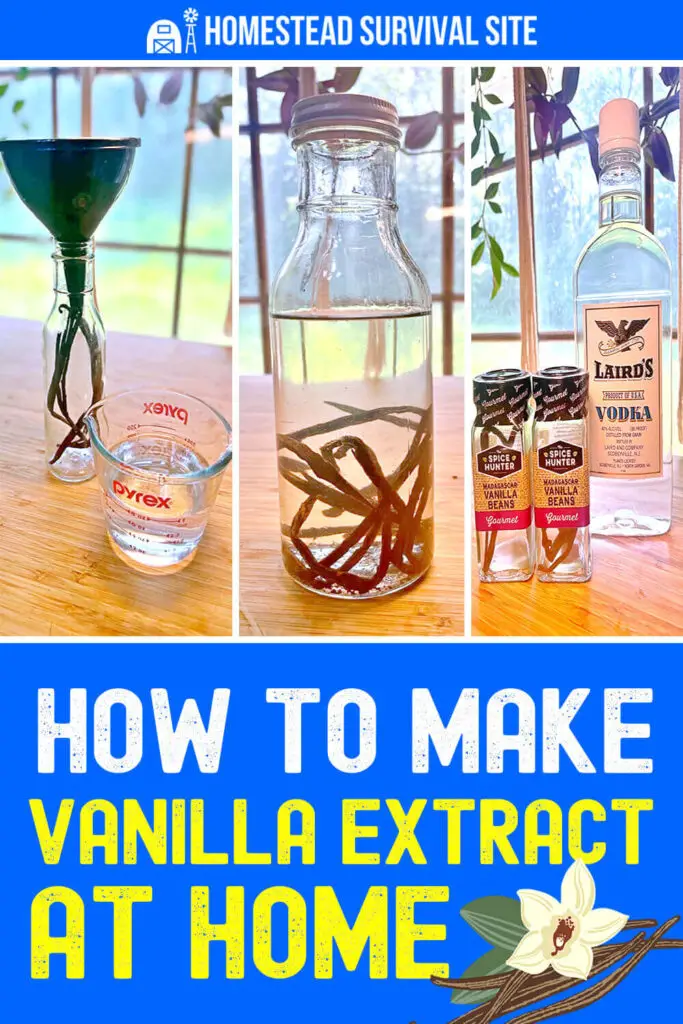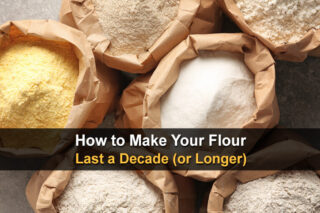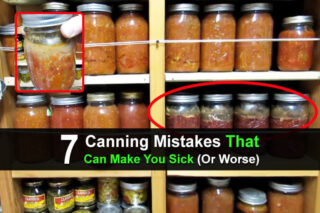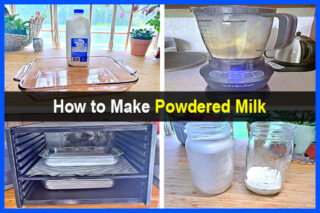Estimated reading time: 9 minutes
I’ve always loved the flavor of vanilla, whether it’s in ice cream, cookies, or coffee. I’m slightly guilty of doubling or tripling the amount of vanilla flavor in a recipe – I just love it that much! Many home cooks use imitation vanilla to save money, but there is nothing like the taste of pure vanilla extract. It’s easy to make and stores well.
In this article, I’ll walk you through the process of making your own vanilla extract. We’ll talk about the ingredients and tools you need, go over the process of making it, and give you some alternative ideas so you can make quick vanilla extract and alcohol-free vanilla. But first, let’s talk about why you want to make your own.
Want to save this post for later? Click Here to Pin It On Pinterest!
Why You Should Make Your Own Vanilla Extract
Imitation Vanilla is typically made from a derivative of wood pulp and cloves. There isn’t any vanilla in it at all! Pure Vanilla Extract is very expensive, but you can make your own with just vodka and vanilla beans.
You have control over the entire process, so you can make your vanilla single or double-fold, and you can make it with different types of beans to get the flavor you like best.
You’ll save money in the long run by making your own vanilla extract, too. I’ll admit, the beans are pretty pricey but since you can continue to add vodka and reuse the beans for as long as they taste good, you’ll definitely get your money’s worth. You don’t need to use expensive alcohol since the flavor comes from the beans and not from the alcohol.
Single-fold and Double-fold Extract
Single-fold and double-fold refer to the strength of the flavor. Double-fold vanilla means the extract has a much stronger flavor than single-fold. You can control this with how many beans you use to make your extract. For single-fold, you would use about four beans to 8 ounces of alcohol, and with double-fold, you would use 6 to 8 beans per 8 ounces.
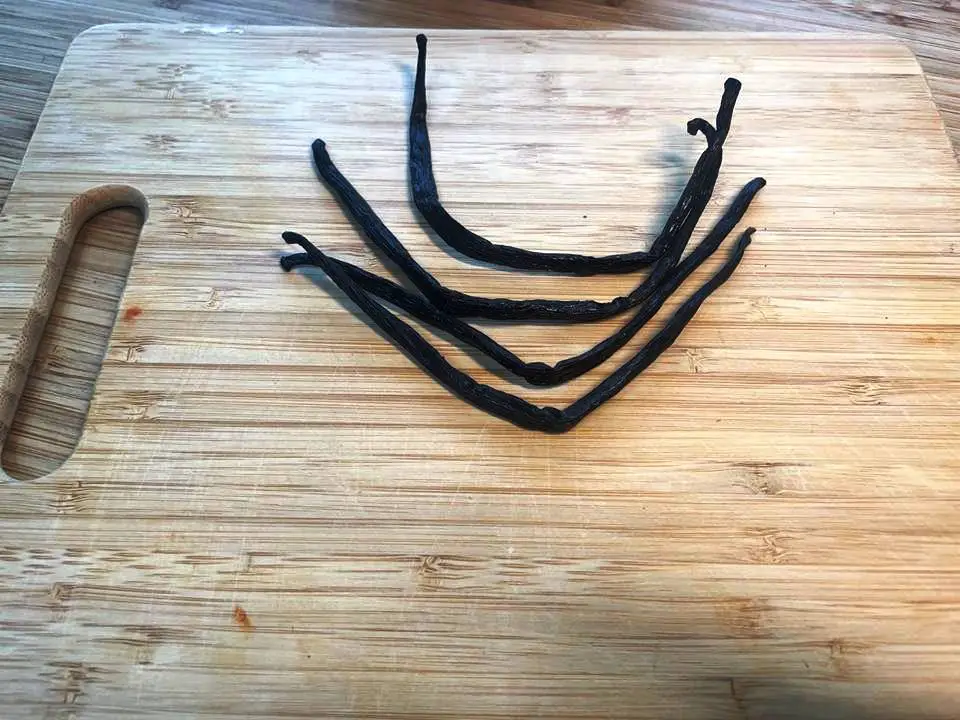
Types of Vanilla Beans
There are three types of vanilla beans: Madagascar, Tahitian, and Mexican. Madagascar Beans give you a traditional, creamy vanilla flavor, while Tahitian beans are a little more fruity and almost cherry flavored, which goes well with Bourbon. Mexican beans have a more distinct flavor. You can even mix different varieties to create your own flavor profile.
Grade A beans are typically longer and have a higher moisture content, which makes them more expensive. Grade B beans are less expensive, so they will save you money if you are making extracts.
Beans to Alcohol Ratio
As we already discussed, the beans-to-alcohol ratio will affect how potent your vanilla extract is. You need to make sure you use enough beans so that your extract has enough flavor.
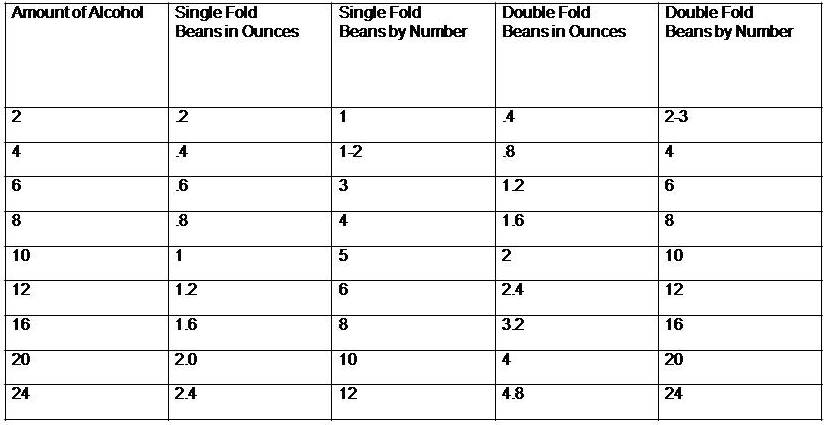
This is just a rough estimate, and you can use whatever ratio of beans to alcohol that suits your tastebuds! If you want to follow the FDA regulations for vanilla extract, use 13.35 ounces of beans per gallon of alcohol. Also, the weight of your beans can vary depending on the length of the bean and the moisture content of the bean. I used 4 beans but they only weighed .4 ounces, since their moisture content was a little bit less.
Make sure that you have enough alcohol to cover your beans completely, even if it means you need to cut your beans into smaller pieces. This will prevent mold and bacteria from growing on your beans.
As you use the extract, you can add more alcohol to keep the beans covered. You can repeat the process until the flavor of the extract becomes too weak. Then, just replace the beans.
A Word of Caution
Your finished vanilla extract will contain alcohol, which will be just as potent as a bottle of alcohol from the state store. You’ll want to use caution if you’re using it to flavor your coffee or hot chocolate in the morning!
However, when you’re adding just a few tablespoons into a cake or a batch of chocolate chip cookies, the high temperature and baking time will cause most of the alcohol to evaporate, leaving behind the delicious vanilla flavor.
Ingredients
Vanilla Beans – I used 4 Madagascar Vanilla Beans
80 Proof Alcohol (vodka, rum, or bourbon) I used 8 ounces of inexpensive vodka, bottled somewhat locally
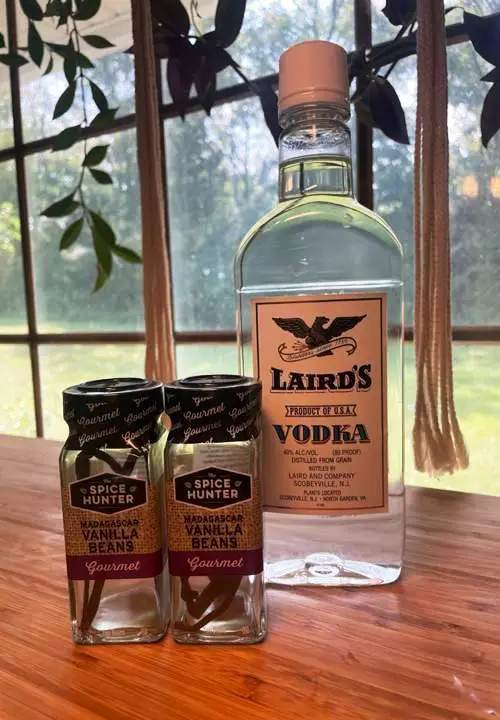
Tools
Funnel
Kitchen knife
Cutting board
Kitchen scale (optional)
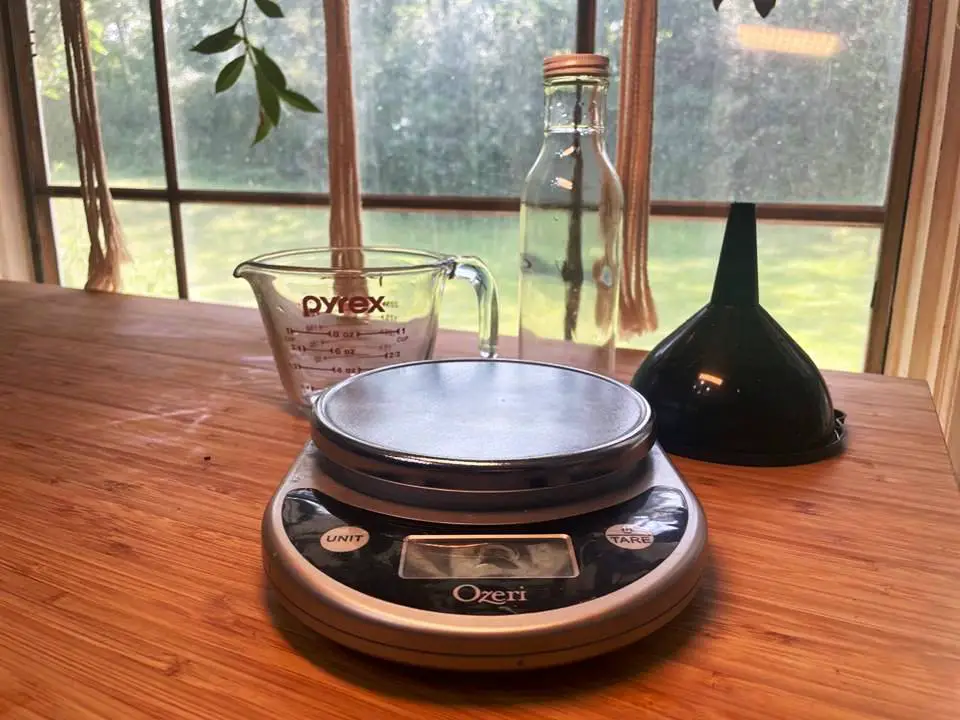
The Process
1. Open up your vanilla beans. First, I sliced my beans lengthwise to open them up. If you use Grade A beans, they’ll have a higher moisture content than Grade B.
Either works fine for vanilla extract. You’ll see inside the tiny specs that look like the specs in natural vanilla ice cream! Try not to lose any in the process. You can leave the beans attached at the end or cut them entirely apart. It doesn’t matter as far as the flavoring goes.
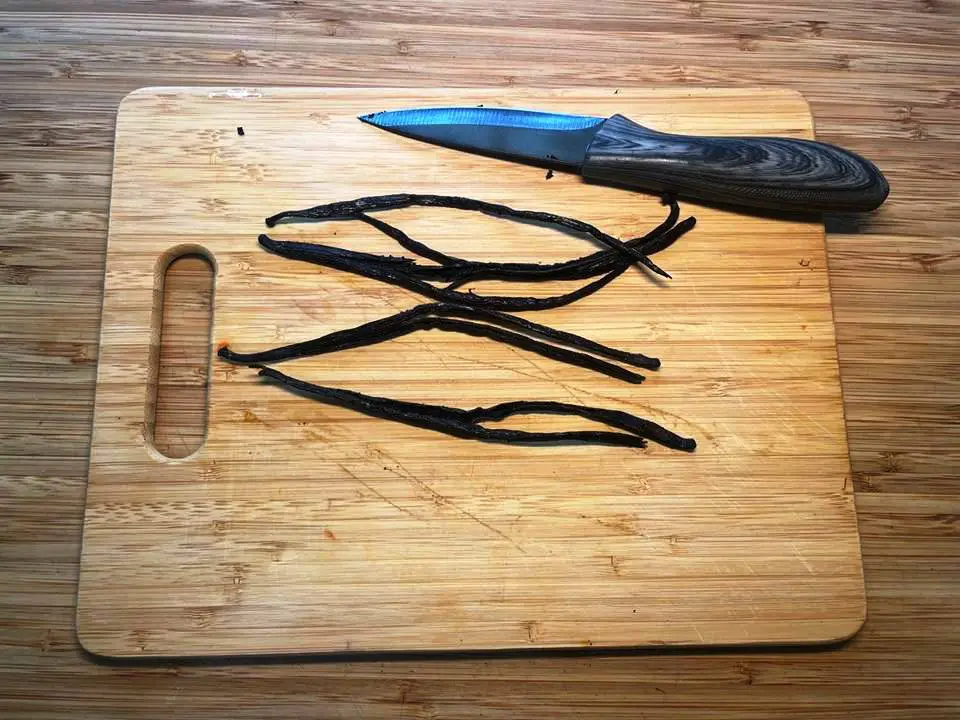
2. Place the beans in your container. I slid all the beans into my glass jar, trying to make sure all those little specs went along for the ride.
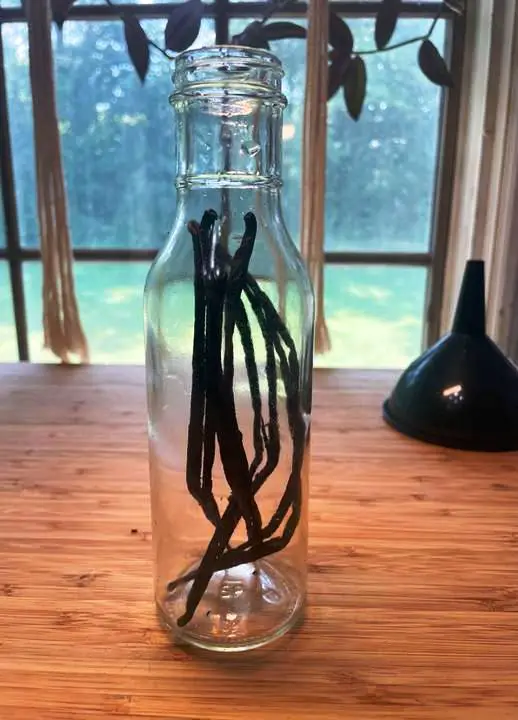
3. Completely cover the beans with the alcohol. This will prevent bacteria from growing. I used a funnel to make it easier. Put the lid on and give it a few shakes. I used a chopstick to push down any bits of bean that were sticking up out of the vodka, and ended up adding just a little extra vodka to the mix.
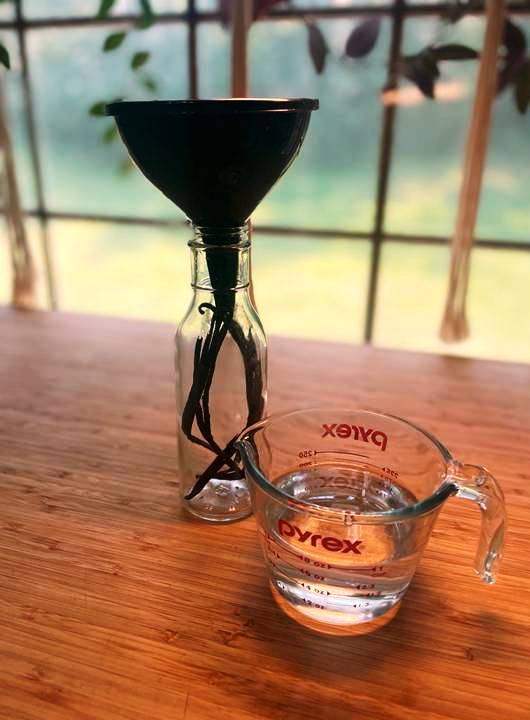
4. Store the vanilla out of direct sunlight and at room temperature. You’ll want to shake it occasionally – every couple of weeks to once a week is great.
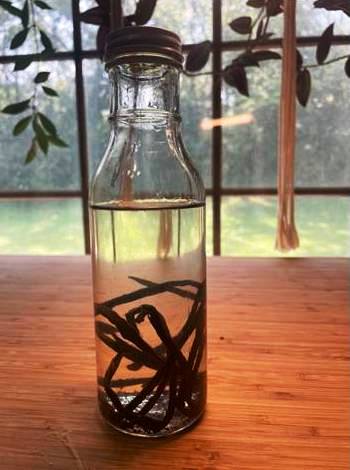
5. Wait. You can use your vanilla after a month, but you won’t get the full flavor until about a year has passed. It will have a rich, dark color and delicious aroma!
6. As you use your extract, you can replace the alcohol you used. Shake it up afterward. You can keep doing this for several years or until the flavor starts to wane. Then, you’ll want to take out the used beans and replace them with fresh beans.
7. As long as the beans are completely submerged, your vanilla extract can last for several years. If you remove the beans, it will last indefinitely.
Tips
Homemade vanilla extract works the same as store-bought and vanilla. Use the same amount that the recipe calls for (unless you’re like me and you love extra vanilla flavoring!).
You don’t need to spend a fortune on alcohol! The flavor will come from the vanilla beans, so you don’t need to worry about getting high-quality alcohol as long as it is 80-proof. Avoid flavored alcohol, as that will mess up the flavor of your vanilla.
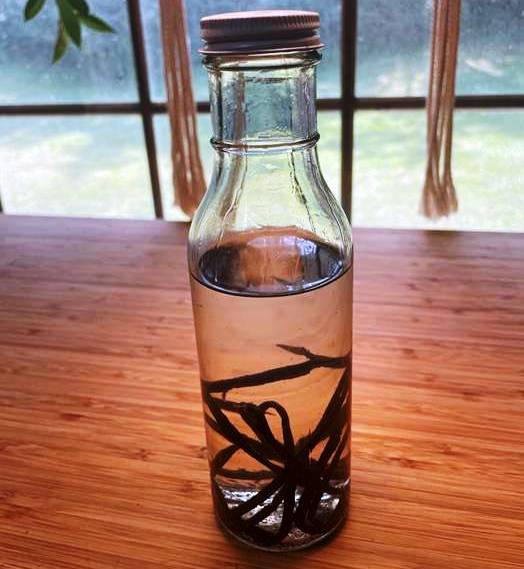
Non-Alcoholic Vanilla Extract
You can make a non-alcoholic version by using glycerin.
Ingredients:
Follow the directions as listed above, but the extract will be ready in about two months. It will have a thicker, syrup-like consistency, but the flavor will be similar. It should last up to 4 years. Glycerin extracts are gluten-free, sugar-free, and alcohol-free. You can use vegetable glycerin to make it appropriate for vegetarian diets.
Instapot Method
If you’re in a hurry, you can use your Instapot to make vanilla extract, although I have not tried it myself. The flavor will not be as rich or as smooth as Vanilla extract that has been aged for six months to a year.
- Follow the directions above for Vanilla Extract made with alcohol, but put your vodka and vanilla beans in 12-ounce canning jars. You’ll want to leave about an inch of headspace at the top of the jar, so use roughly 8 ounces of vodka in a 12-ounce canning jar. Use traditional metal canning lids and finger-tighten them closed.
- Add one cup of water to the bottom of the Instapot.
- Place the Instapot trivet in the bottom of the pot and place the jars on the trivet.
- Close the Instapot lid and set the pressure valve to sealing. This is important because alcohol vapors are flammable. By the way, make sure you aren’t using any open flames during this process!
- Use the manual setting (or high-pressure cook setting) for 35 to 45 minutes.
- Allow the pressure to naturally release for 1 hour after cooking is complete.
- After the hour mark, you can turn the valve to vent to release any leftover pressure. Carefully open the lid away from you so you don’t get burned.
- Unplug your Instapot and allow the jars to cool before removing them.
- You can leave the extract in the canning jars or transfer it to pretty bottles if you prefer.
Always be careful when using a pressure cooker and follow your machine’s directions.
Like this post? Don't Forget to Pin It On Pinterest!

Homemade Vanilla Extract
Equipment
- 1 Measuring cup
- 1 glass bottle with cap
- 1 digital scale
- 1 funnel
Ingredients
- 4 whole vanilla beans
- 8 ozs. 80 proof vodka
Instructions
- Open up your vanilla beans. First, I sliced my beans lengthwise to open them up. If you use Grade A beans, they’ll have a higher moisture content than Grade B. Either works fine for vanilla extract. You’ll see inside the tiny specs that look like the specs in natural vanilla ice cream! Try not to lose any in the process. You can leave the beans attached at the end or cut them entirely apart. It doesn’t matter as far as the flavoring goes. Here's a chart that shows you the proportions of vanilla beans to vodka:
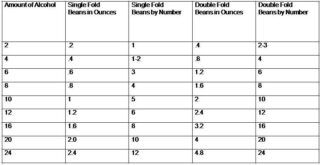
- Place the beans in your container. I slid all the beans into my glass jar, trying to make sure all those little specs went along for the ride.
- Completely cover the beans with the alcohol. This will prevent bacteria from growing. I used a funnel to make it easier. Put the lid on and give it a few shakes. I used a chopstick to push down any bits of bean that were sticking up out of the vodka, and ended up adding just a little extra vodka to the mix.
- Store the vanilla out of direct sunlight and at room temperature. You’ll want to shake it occasionally – every couple of weeks to once a week is great.
- Wait. You can use your vanilla after a month, but you won’t get the full flavor until about a year has passed. It will have a rich, dark color and delicious aroma!
- As you use your extract, you can replace the alcohol you used. Shake it up afterward. You can keep doing this for several years or until the flavor starts to wane. Then, you’ll want to take out the used beans and replace them with fresh beans.
- .As long as the beans are completely submerged, your vanilla extract can last for several years. If you remove the beans, it will last indefinitely.
TIPS
- Homemade vanilla extract works the same as store-bought and vanilla. Use the same amount that the recipe calls for (unless you’re like me and you love extra vanilla flavoring!). You don’t need to spend a fortune on alcohol! The flavor will come from the vanilla beans, so you don’t need to worry about getting high-quality alcohol as long as it is 80-proof. Avoid flavored alcohol, as that will mess up the flavor of your vanilla.
Non-Alcoholic Vanilla Extract
- You can make a non-alcoholic version by using glycerin
- Follow the directions as listed above, but the extract will be ready in about two months. It will have a thicker, syrup-like consistency, but the flavor will be similar. It should last up to 4 years. Glycerin extracts are gluten-free, sugar-free, and alcohol-free. You can use vegetable glycerin to make it appropriate for vegetarian diets.
Instapot Method
- If you’re in a hurry, you can use your Instapot to make vanilla extract, although I have not tried it myself. The flavor will not be as rich or as smooth as Vanilla extract that has been aged for six months to a year. Follow the directions above for Vanilla Extract made with alcohol, but put your vodka and vanilla beans in 12-ounce canning jars. You’ll want to leave about an inch of headspace at the top of the jar, so use roughly 8 ounces of vodka in a 12-ouncecanning jar. Use traditional metal canning lids and finger-tighten them closed. Add one cup of water to the bottom of the Instapot.Place the Instapot trivet in the bottom of the pot and place the jars on the trivet. Close the Instapot lid and set the pressure valve to sealing. This is important because alcohol vapors are flammable. By the way, make sure you aren’t using any open flames during this process!
- Use the manual setting (or high-pressure cook setting) for 35 to 45 minutes. Allow the pressure to naturally release for 1 hour after cooking is complete. After the hour mark, you can turn the valve to vent to release any leftover pressure. Carefully open the lid away from you so you don’t get burned. Unplug your Instapot and allow the jars to cool before removing them. You can leave the extract in the canning jars or transfer it to pretty bottles if you prefer.
- Always be careful when using a pressure cooker and follow your machine’s directions.
You May Also Like:



